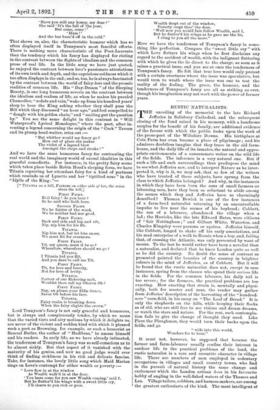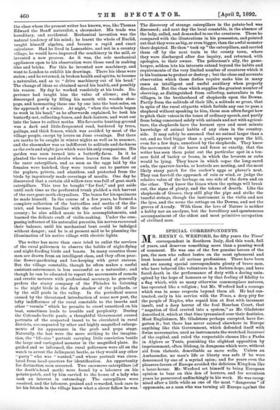RUSTIC NATURALISTS.
THE unveiling of the memorial to the late Richard Jefferies in Salisbury Cathedral, and the subsequent closing of the fund raised in his memory, with a handsome surplus for the benefit of his family, are additional evidence of the favour with which the public looks upon the work of the prose-poet of the Wiltshire Downs. His birthplace at Cote Farm has even become a place of pilgrimage ; and his admirers doubtless imagine that they trace in the old farm- house, and the daily life of its inmates, the natural and appro- priate environments of a consummate writer on the wild life of the fields. The inference is a very natural one. But if such a life and such surroundings thus predispose the mind to see what Jefferies saw, and to interpret Nature as be inter- preted it, why is it, we may ask, that so few of the writers who have treated of these subjects, have sprung from the class to which Jefferies belonged P And why, in the instances in which they have been born the sons of small farmers or labouring men, have they been so reluctant to abide among the scenes which they and Jefferies have so charmingly described? Thomas Bewick is one of the few instances of a farm-bred naturalist returning by an uncontrollable impulse to live near the scenes of his boyhood; Cobbett, the son of a labourer, abandoned the village when a lad ; the Howicks, like the late Edward Bates, were citizens of "fair Nottingham ; " and Gilbert White, Waterton, and Charles Kingsley were parsons or squires. Jefferies himself, like Cobbett, longed to shake off his early associations, and his mad enterprise of a walk to Russia when a boy, and, failing that, of crossing the Atlantic, was only prevented by want of means. To the last he would rather have been a novelist than a naturalist, and declared that he knew London quite as well as he did the country. No doubt the sense of contrast so presented painted the beauties of the country in brighter colours in the mind of Jefferies, as of Cobbett. But it will be found that the rustic naturalist does not, except in rare instances, spring from the classes who spend their serious life in the fields. For the common labourer, his daily toil is too severe ; for the farmers, the practical problems are too exacting. How exacting that strain is, mentally and physi- cally, both for master and man, the reader may gather from Jefferies' description of the harvesting of the " hundred- acre " corn-field, in his essay on "The Loaf of Bread." It is only the shepherds on the hills, while keeping their flocks as of old, who are still free to see visions and dream dreams, or watch the stars and nature. For the rest, such contempla- tion fails to give the change of thought they need. Like Piers the Ploughman, they would turn their backs upon the fields, and go
"wide into this world, Wonders for to hear."
It must not, however, be supposed that because the farmer and farm-labourer usually confine their interest in, outdoor life to the practical problems of the land, the rustic naturalist is a rare and eccentric character in village life. There are numbers of men employed in sedentary occupations in villages and small country towns, who find in the pursuit of natural history the same change and excitement which the London artisan does in his favourite hobby of angling in the well-fished waters of the Thames and Lea. Village tailors, cobblers, and harness-makers, are among the greatest enthusiasts of the kind. The most intelligent of the class whom the present writer has known, was, like Thomas Edward the Banff naturalist, a shoemaker. His trade was hereditary, and accidental. Mechanical invention was the natural tendency of his mind ; he learnt the whole of Euclid, taught himself algebra, and became a rapid and exact calculator. Had he lived in Lancashire, and not in a country village, he would have improved the machinery in the mill, or invented a new process. As it was, the sole mechanical appliances open to his observation were those used in making tiles and bricks. For this he invented new machinery, and went to London to exhibit his drawings. There his ideas were stolen; and he returned, in broken health and spirits, to become a naturalist, and so to "drive machinery out of his head." The change of ideas so obtained saved his health, and possibly his reason. By day he worked resolutely at his trade. Ex- ,perience had taught him the value of silence; and he discourged gossip by filling his month with wooden shoe- pegs, and hammering these one by one into the boot-soles, on the approach of a visitor. At night, "when the wheels began to work in his head," as he afterwards explained, he took his butterfly-net, collecting-boxes, and dark-lantern, and went out 'into the lanes to collect moths. His favourite hunting-ground was a dark and little-frequented road, bordered by trees, palings, and thick fences, which was avoided by most of the -village people, except by lovers on June evenings. But there are moths to be caught in winter nights as well as in summer, and the shoemaker was as indifferent to solitude and darkness as the owls and night-jars which were his only companions. His garden was soon turned into a butterfly-farm. In it he planted the trees and shrubs whose leaves form the food of the rarer caterpillars, and as soon as the eggs laid by the females were hatched, they were turned out to pasture on the poplars, privets, and alanthus, and protected from the birds by ingeniously made coverings of muslin. One day he discovered that a certain old willow-tree was fall of goat-moth caterpillars. This tree he bought "for fuel," and put aside until such time as the perforated trunk yielded a rich harvest of the rare goat-moth chrysalises. The boxes for his specimens he made himself. In the course of a few years, he formed a complete collection of the butterflies and moths of the dis- trict, and became familiar with the other wild life of the county ; he also added music to his accomplishments, and learned the delicate craft of violin-making. Under the com- posing influence of his naturalist pursuits, his nerves recovered their balance, until his mechanical bent could be indulged without danger ; and he is at present said to be planning the illumination of his native village with electric lights.
The writer has more than once tried to enlist the services of the rural policemen to observe the habits of night-flying and night-feeding birds and beasts. In many counties these men are drawn from an intelligent class, and they often prac- tise flower-gardening and bee-keeping with great success. But the village constable, though he often makes a useful assistant-astronomer, is less successful as a naturalist; and though he can be educated to report the movements of comets and erratic meteors with professional accuracy, he generally prefers the starry company of the Pleiades to listening to the night birds in the dark shadow of the pollards, or by the still pools in the valley. In the periodical scares caused by the threatened introduction of some new pest, the lofty indifference of the rural constable to the insects and other " vermin " which he permits to crawl unnoticed on his beat, sometimes leads to trouble and perplexity. During the Colorado-beetle panic, a thoughtful Government caused portraits of the suspected insect to be circulated in rural districts, accompanied by other and highly magnified enlarge- ments of its appearance in the grub and pupa stage. Naturally, the last were the more striking to the imagina- tion, the " life-size " portrait carrying little conviction beside the large and variegated monster in the magnified plate. So guided and so informed, the rural policemen were all on the watch to arrest the delinquent beetle, as they would any other " party " who was "wanted," and whose portrait was circu- lated from head-quarters for identification. An opportunity for distinction soon occurred. Two enormous caterpillars (of the death's-head moth) were found by a labourer on his potato-patch, and by him carried to the house of a lady who took an interest in entomology. The caterpillars were received, and the labourer, praised and rewarded, took care to let his friends in the village know what a clever fellow he was. The discovery of strange caterpillars in the potato-bed was discussed ; and next day the local constable, in the absence of the lady, called, and demanded to see the creatures. These he compared with the illustrations in his possession, and pointed out that they were as big, or even bigger, than the awful monster there depicted. He then "took lip "the caterpillars, and carried them off by the next train to the county town, where they were discharged after due inquiry, and returned, with apologies, to their owner. The policeman's ally, the game- keeper, seldom lets his interests extend beyond the habits and requirements of the very limited number of creatures which it is his business to protect or destroy ; but the close and accurate observation which these duties require make him in many cases an intelligent and useful auxiliary when properly directed. But the class which supplies the greatest number of observing, as distinguished from collecting, naturalists in the villages, is the brotherhood of shepherds upon the Downs. Partly from the solitude of their life, a solitude so great, that in spite of the rural etiquette which forbids any one to pass a shepherd without speaking to him, these men often forget how to pitch their voices in the tones of ordinary speech, and partly from being concerned solely with animals and not with agricul- ture, the shepherds have the keenest eyes and most minute knowledge of animal habits of any class in the country- side. It may safely be assumed that no animal larger than a rat, and no bird bigger than a quail, appears upon the hill, even for a few days, unnoticed by the shepherds. They know the movements of the hares and foxes so exactly, that the writer has seen them point out the particular spot in a ten- acre field of barley or beans, in which the leverets or cubs would be lying. They know in which copse the long-eared owls, the sparrow-hawks, or kestrels are nesting, and the most likely stony patch for the curlew's eggs or plover's nest. They can foretell the approach of rain or wind, or judge the relative value of the herbage on one side of the down and on the other. They know the times when the springs will break out, the signs of plenty, and the tokens of dearth. Like the shepherds of Greece, they still play the pipe and strike the tuneful strings, though the instrument is the violin and not the lyre, and the scene the cottage on the Downs, and not the groves of Arcady. With them the love of Nature is neither a hobby nor an anodyne, but the hereditary and spontaneous accompaniment of the oldest and most primitive occupation of civilised man.



































 Previous page
Previous page